The EU’s sixth sanctions package against Russia is taking shape, even as Russian forces commit ever-greater atrocities in an effort to claim some kind of victory in Ukraine. The sixth batch of sanctions has faced headwinds from the Visegrad group, with Hungary, Slovakia and the Czech Republic notably reluctant to back a complete embargo on Russian oil, yet European Commission President Ursula von der Leyen expressed confidence in an eventual agreement. “We will get this package on track – if it takes a day longer, it takes a day longer – but we are moving in the right direction,” von der Leyen explained.
While public attention is focused on the urgent imperative to pass the package currently under discussion –“politically, Europe cannot afford not adopting the sixth package”, one EU diplomat recently underlined– European decision-makers are undoubtedly already preparing for a seventh sanctions package given the ongoing savagery in Ukraine. On 6 May, Amnesty International confirmed that it has documented extensive war crimes in the outskirts of Kyiv, and more such horrors will likely be uncovered as Russia pulls back from occupied areas. There is plenty of untapped territory for the seventh sanctions package to target: some of Russia’s most prominent tycoons have so far escaped restrictions despite their close ties to the Kremlin and the Russian military machine.
Potanin: the war profiteer
“Nickel King” Vladimir Potanin is one of the most obvious candidates for future European sanctions. One of the architects of the loans-for-shares scheme through which most of Russia’s oligarchs made their fortunes in the 1990s, Potanin was a deputy prime minister under Yeltsin and has kept up good relations with his successor, regularly playing ice hockey with Putin.
Remarkably, despite his longstanding loyalty to the Kremlin, Potanin has not only managed to evade Western sanctions so far, but – while many of his fellow oligarchs have seen their fortunes dwindle since the February 24 invasion of Ukraine – the Nornickel CEO has actually managed to turn the conflict into a financial opportunity.
In the past month, Potanin has scored a hat trick of deals. First, the oligarch reaped the benefits of Société Générale’s decision to take a $3 billion hit in order to exit the Russian market, picking up the French banking giant’s entire share in Rosbank for what analysts suspect was a “nominal price” close to zero. Just days later, Potanin profited from the misfortunes of fellow tycoon Oleg Tinkov, the founder of one of Russia’s largest private banks, Tinkoff Bank. Tinkov told Forbes that, after he – unlike Potanin – broke with Putin to openly criticize the invasion of Ukraine, the Kremlin forced him to sell his shares in Tinkoff Bank to Potanin for around 3% of their true value. Finally, just days ago Potanin picked up a card processing firm whose owner was exiting the Russian market.
The fact that Potanin is financially benefiting from the turmoil in Ukraine is already a strong argument for European sanctions against him, but there are even deeper concerns about his budding banking empire. “It looks like a decision has been made to consolidate some of the assets in financial services not in the hands of state banks, but in the hands of a loyal private group,” Vladimir Milov, a dissident Russian politician and economist in exile, told Forbes, seemingly implying that the Kremlin was masterminding Potanin’s recent acquisitions.
Smaller fish abound in strategic sectors
Potanin may be particularly overdue for European sanctions, but there are countless other Russian tycoons whose tight ties with the government or presence in strategic sectors makes them ripe targets for an eventual seventh sanctions package.
CEO of natural gas producer Novatek Leonid Mikhelson, for example, has featured on potential sanctions lists for years and was sanctioned by Canada and the UK following the invasion of Ukraine. He remains notably absent, however, from the list of individuals sanctioned by the EU. Mikhelson’s freedom from European sanctions is remarkable given his extensive business ties to Putin’s long-time friend and judo partner Gennady Timchenko, as well as the fact that Novatek has been described as “one of Putin’s favourite companies” through which the Kremlin hoped to export LNG to Europe.
A new approach to sanctions?
As analysts have pointed out, many oligarchs have escaped sanctions so far due to a complex mixture of political, economic and geostrategic considerations.
Lukoil founder Vagit Alekperov, for example, has avoided sanctions largely because he is seen as comparatively more independent than Rosneft CEO Igor Sechin, who would pounce on Lukoil if Alekperov were sanctioned.
Questions are mounting, however, over whether this piecemeal approach is paying off. “In order for these people to put pressure on the Kremlin,” one consultant advised, advocating for sanctioning all the major oligarchs at once, “they themselves will have to feel pain”. Some prominent tycoons have felt pain – while others, such as Potanin, have expanded their business empire, and unsanctioned oligarchs in strategic sectors have continued to feed the Russian economy. With reports that the war in Ukraine may soon enter a “new phase” with Putin calling for a full mobilization, the time may be ripe for a new, broader phase of sanctions policy.


